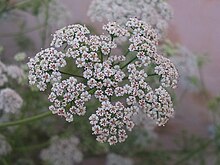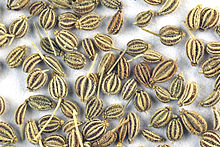Ajwain
| Ajwain | |
|---|---|

|
|
| Flowers of Trachyspermum ammi | |
| Scientific classification | |
| Kingdom: | Plantae |
| Clade: | Tracheophytes |
| Clade: | Angiosperms |
| Clade: | Eudicots |
| Clade: | Asterids |
| Order: | Apiales |
| Family: | Apiaceae |
| Genus: | Trachyspermum |
| Species: |
T. ammi
|
| Binomial name | |
|
Trachyspermum ammi |
|
| Synonyms | |
Ajwain or ajowan (Trachyspermum ammi) () —also known as ajowan caraway, omam (in Tamil), thymol seeds, bishop's weed, or carom—is an annual herb in the family Apiaceae. Both the leaves and the seed‑like fruit (often mistakenly called seeds) of the plant are consumed by humans. The name "bishop's weed" also is a common name for other plants. The "seed" (i.e., the fruit) is often confused with lovage seed.
Description

Ajwain's small, oval, seed-like fruits are pale brown schizocarps, which resemble the seeds of other plants in the family Apiaceae such as caraway, cumin and fennel. They have a bitter and pungent taste, with a flavor similar to anise and oregano. They smell like thyme because they also contain thymol, but they are more aromatic and less subtle in taste, as well as being somewhat bitter and pungent. Even a small number of fruits tend to dominate the flavor of a dish.
Cultivation and production
Ajwain grows in dry, barren soil in its indigenous regions of India, Iran, Afghanistan, and parts of northern Africa. Gujarat and Rajasthan are regions in India well-known for cultivating ajwain.
Culinary uses
The fruits are rarely eaten raw; they are commonly dry-roasted or fried in ghee (clarified butter). This allows the spice to develop a more subtle and complex aroma. It is widely used in the cuisine of the Indian subcontinent, often as part of a chaunk (also called a tarka), a mixture of spices – sometimes with a little chopped garlic or onion – fried in oil or clarified butter, which is used to flavor a dish at the end of cooking. It is also an important ingredient for herbal medicine practiced there. In Nepal, Jwano Ko Jhol- brothy soup of ajwain, has been in traditional cuisine that is mostly consumed to recover from respiratory problems, and during postpartum recovery. In Afghanistan, the fruits are sprinkled over bread and biscuits.
Other applications of ajwain include incorporating the seeds in specific types of breads, such as naans and parathas. The seeds can also be used as a mouth freshener when mixed with lemon juice and black pepper and then dried or can simply be used as an ingredient in hot tea.
As a medication
There is no high-quality clinical evidence that ajwain has anti-disease properties in humans. Ajwain is used in traditional medicine practices, such as Ayurveda in herbal blends in the belief it can treat various disorders. There is no evidence or regulatory approval that oral use of ajwain in herbal blends is effective or safe.
Adverse effects
Women who are pregnant should not use ajwain due to potential adverse effects on fetal development, and its use is discouraged while breastfeeding. In high amounts taken orally, bishop's weed is possibly toxic and can result in fatal poisoning. People taking nonsteroidal anti-inflammatory drugs or antiplatelet medications are susceptible to adverse effects by ajwain ingestion.
Essential oil
Hydrodistillation of ajwain fruits yields an essential oil consisting primarily of thymol, gamma-terpinene, p-cymene, and more than 20 trace compounds which are predominantly terpenoids.